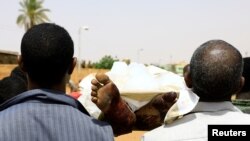(Leslie Bonilla contributed to this article.)
WASHINGTON — Reports from Sudan say at least 11 people were killed in the latest mass protests demanding a transition to civilian rule in the country.
Police fired tear gas as tens of thousands of people took to the streets on Sunday in the capital Khartoum and other areas in the first such demonstration since a June deadly crackdown on protesters. More demonstrations were reported Monday.
In Washington, the United States condemns the violence used against civilians.
“Sudanese security forces’ use of live ammunition against peaceful protesters was reprehensible, and military authorities should be held accountable for the resulting deaths,” a State Department official told VOA on Monday.
“The peaceful demonstrations in Khartoum and many other cities throughout Sudan on June 30 underscore the demand of the people of Sudan for a civilian-led transitional government,” added the official.
Protest organizers took to Facebook to decry the actions by the military on Sunday.
“The military council is completely responsible for these lives lost,” Mohamed Naji al-Assam, a prominent protest leader, said in a video on his Facebook page.
The generals also took to Facebook to lay blame on the protest movement, Alliance for Freedom and Change.
“Freedom and Change bears the entire responsibility for these violations and the casualties among regular forces and citizens,” said General Jamal Omer in a video posted on the ruling military government’s Facebook page.
Tensions between protesters demanding civilian rule and military leaders have been rising since the coup that forced out the long-ruling autocrat Omar al-Bashir. Talks between the two sides collapsed on June 3, when the military lethally dispersed a protest sit-in outside military headquarters in Khartoum. Protest organizers said the death toll from the crackdown was at least 128, while authorities claim it was 61, including three security personnel.
The European Union and several Western countries have called on the generals to avoid bloodshed.
Ethiopia and the African Union have offered a plan for a civilian-majority body, which the generals say could be the basis for new negotiations.
Sudan has been run by the Transitional Military Council (TMC) after its longtime ruler Omar al-Bashir was ousted on April 11.
U.S. officials have urged all sides to work toward “creating an enabling environment” between the TMC and an opposition coalition, the Forces of Freedom and Change (FFC), for talks to resume.
The African Union and several Western countries also urged the military to transfer authority to civilian rule.
Senior State Department officials have suggested Washington would consider all options, including possible sanctions if there was more violence used by Sudanese security forces against peaceful demonstrators.
The United States sanctioned Sudan under Bashir over its alleged support for militant groups. Trade sanctions against Sudan were lifted in 2017 by the U.S., citing Sudan’s progress in human rights and counterterrorism.




